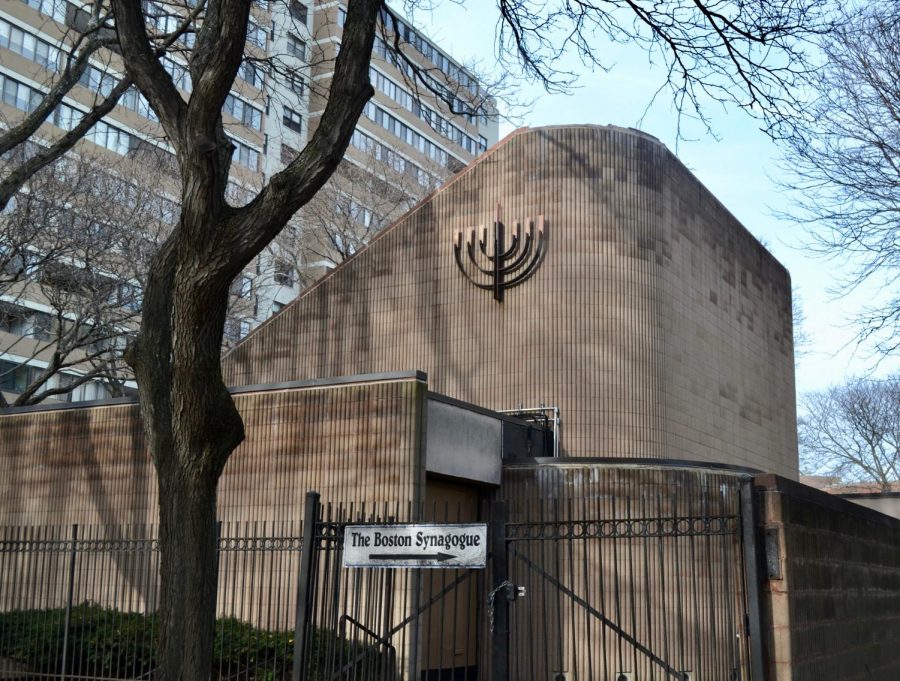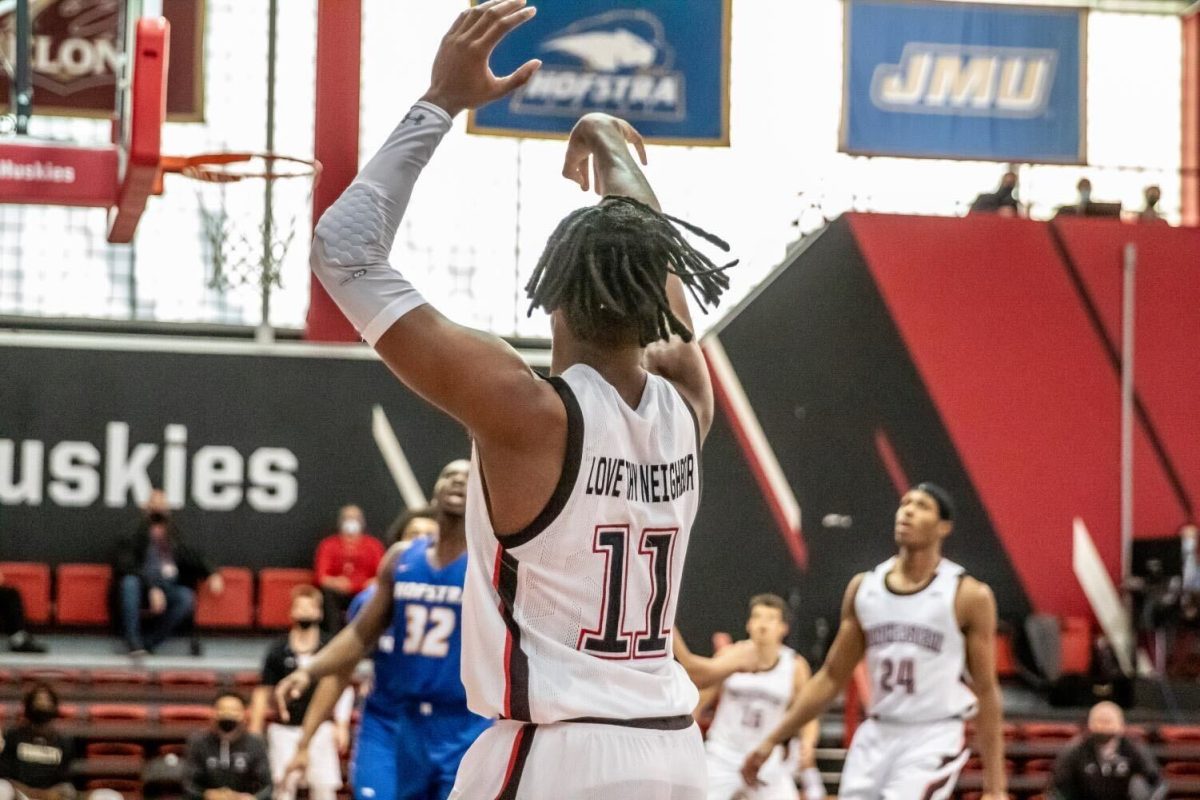Boston Synagogue weighs security questions post-Pittsburgh
The Boston Synagogue, located on 55 Martha Road. The synagogue has tightened its security due to concerns over rising anti-semitism.
January 16, 2019
Daniel and Ashley Liss arrived early at the Boston Synagogue for a Friday evening service on Nov. 30. As they approached the main entrance, a sign read, “Doors will be kept locked at all times, press buzzer for entry.”
After the shooting at the Tree of Life synagogue in Pittsburgh that left 11 people dead on Oct. 27, the Boston Synagogue was among many in Massachusetts that tightened security. Its main door, usually open Friday evenings for service hours, is now locked and must be opened manually by a member of the synagogue who will identify guests before welcoming them in.
“I’ve never actually been here but I want to see what it’s like … Maybe I will become a member of the community,” Daniel Liss said while trying out a yarmulke displayed at the entrance. Liss has been trying different synagogues since the shooting, and until this Friday night, he had not found one with locked doors but thinks that may change in light of the surge in anti-Semitic incidents nationwide.
Anti-Semitic incidents in the United States rose 57 percent in 2017, according to a report by the Anti-Defamation League. In Massachusetts alone, there were 177 anti-Semitic incidents reported in 2017 including harassment, vandalism, school incidents and threats made against Jewish institutions.
At the Boston Synagogue, congregants expressed their worries and leaders are now taking action to keep them safe, but the dilemma — the wish to keep the synagogue an open and welcoming place — remains. The response from synagogues and the larger Jewish community is complicated, however, by the fact that anti-Semitic hate crimes are often connected to or motivated by hatred against other minority groups.
“That sign on the door – we didn’t have it before. It has just been here after the Pittsburgh [shooting],” said Michael Weingarten, a member of the Boston Synagogue board of directors. Next to where he stood, an article on the Tree of Life shooting from a local Jewish newspaper, The Jewish Advocate, is printed in color, framed and displayed among other leaflets for programs at the synagogue.
For leaders of the synagogue, gone are the days when their biggest worries were the swastikas that vandalized the synagogue’s wall. “That seems benign in comparison. Now we are worrying there could be an active shooting situation where somebody comes in with an [AR-15] and shoots everybody and people die,” Weingarten said.
The Anti-Defamation League is a nonprofit civil rights organization that helps fight anti-Semitism and other forms of hate by providing comprehensive security manuals for staffs and congregants to make their synagogues more secure. Dan Levenson, the associate regional director of the Anti-Defamation League New England, said these security strategies include establishing simple building-access policies such as a buzzer on the main door, surveillance cameras, elaborate lighting and alarm systems and digital and online security.
Daniel and Ashley Liss said they don’t mind the tightened security and it certainly would not stop them coming to the synagogue, but added they don’t necessarily feel unsafe at this time.
“I feel like that is sort of a problem on our large societal scale. I don’t feel that I individually am going to be shot so it’s more [in] the back of my mind presence,” Daniel Liss said.
Members of the Boston Synagogue said they feel President Donald J. Trump is instrumental in encouraging a climate of anti-Semitism.
“Jews are feeling … attacked both from the extreme right and the extreme left,” Weingarten said. “The president is now reaching out to a base, some of whom think it’s now acceptable to be anti-Jewish.”
Demonstrators at the 2017 Unite the Right rally in Charlottesville, Virginia chanted anti-Semitic slogans, such as “Jews will not replace us” and “blood and soil.” The event prompted public outrage after a man drove his car into a crowd of counter-protestors, killing 32-year-old Heather Heyer and injuring more than a dozen others.
Trump responded to the events saying, “There are fine people on both sides.” This response, Weingarten said, was an example of the president “giving license to people to be anti-Semitic as well as anti-black or anti-Hispanic.”
Although Daniel Liss has not been a victim of anti-Semitic hate crimes, he said he feels Trump’s election makes the future of Jews in the United States uncertain. He recalled reading an article years ago about white supremacist groups recruiting Jewish members.
“That’s sort of how far Jews have come … that the people who traditionally hated us [were] trying to partner with us, and that just completely stopped and we became enemy again,” he said.
As someone who is converting to Judaism, Ashley Liss said she is still trying to wrap her head around the current climate.
“I’m sort of in between places right now. It’s the first time in my life I’ve ever had to think about this [as] someone from the Jewish side,” she said.
Martin Blatt, a professor of the practice of history and director of the public history program at Northeastern University, said anti-Semitism has been around “as long as there have been Jews,” adding that we have a current president who is “not only condoning but is encouraging the hatred.” But he was also careful to place this hatred of American Jews in the context of a wider hatred for minority groups in the United States.
“The recent anti-Semitism attacks are horrible … but we need to look at it within context,” Blatt said. The context here is that throughout U.S. history, ethnic and racial hatred is not “confined to Jews by any means,” it was targeted at Blacks, Hispanics and other non-white immigrants as well, he said.
The perpetrator of the Pittsburgh shooter was not only anti-Semitic, he denounced HIAS, a Jewish nonprofit that resettles refugees in the United States. He blamed them for bringing in immigrants that “kill our people.”
Around the same time of the shooting in Pittsburgh, Trump characterized refugees from Central America heading for the U.S. border as “gang members,” “animals” and “unknown Middle Easterners” coming to “infest our country.” Blatt said Americans need to be mindful of the history of hatred for Jews but also be careful “not to pull that stand out and separate it from the hatred that the president is urging and endorsing.”
For those in leadership positions at the Boston Synagogue, providing security is a hard but necessary job.
“Almost all of our members are concerned and they want to know what we are doing about it,” Weingarten said.
To ensure that incidents like Pittsburgh don’t happen here, an even tighter security system has constantly been in discussion by board members, Weingarten said. While he declined to detail the synagogue’s new security measures, he said the board has considered every possible upgrade.
“In Pittsburgh, they had the doors open on Saturday, unlocked, and that’s something that can’t happen anymore,” Weingarten said.
A middle ground where a synagogue can remain a peaceful, open place of worship and still be secure enough to keep its members safe is hard to reach, but these new members lean more toward openness. On that Friday night at the Boston Synagogue, the bell buzzed again as more visitors and congregants arrived. The sign insists any person seeking entry to the synagogue will be questioned, and if there is any doubt about their purpose, they will not be admitted.
The first thing newcomers Daniel and Ashley Liss heard as the door was opened to them? “Hello, welcome to the synagogue!”







